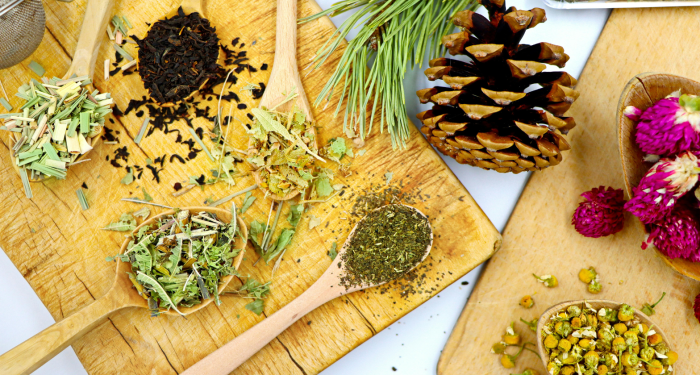Learn more about the history of plant-based diets in this interview with Black vegan scholar Solaire Denaud.
Although veganism is a fairly new movement, plant-based eating dates back as early as the 16th century in the Black Diaspora. To learn more about this topic, we spoke with Solaire Denaud, a Ph.D. student in the Comparative Literature program at the University of California Santa Barbara who studies the occurrences of plant-based diets throughout the Black Diaspora. Keep reading to learn about what Denaud has to say about Black Veganism, the Rastafari movement, and the Ital Diet.
VegOut (VO): How were you first introduced to plant-based eating and what was your initial opinion on it?
Solaire Denaud (SD): Back in Paris, I studied Environmental Humanities and Ethics in philosophy, so I was surrounded by vegetarians and vegans. I, however, was very resistant to it at first. I was already cautious about my meat consumption, primarily because I was aware that the African continent and the Caribbean are the first to suffer consequences of climate change even though they barely participate in global emissions—and a large part of my family, including my father, lives in Haiti. I wanted to do my part. However, I felt that the grammar and arguments of mainstream vegan movements were often rooted in colonial mastery (a need to explain to Black and Brown people that what they are doing and eating is “wrong,” which to me is rooted in white privilege and colonialism). I once tried attending a vegan fair in Paris and felt entirely out of place.
Additionally, at the time, I felt that as a Black and Queer person, I was already carrying too much weight, and it felt that I could not take any more suffering on my own. At the same time, I was internally conflicted. My cultural heritage, when it comes to cuisine, is already vegan-friendly. Caribbean food is so easy to veganize that it almost felt like an invitation to eat plant-based. French cuisine, however, is the contrary. Good luck finding any French dish without meat, butter, or crème fraîche! Seeing the importance of plants (for food and medicine) in Caribbean and West African cuisines made me want to know more.

Solaire Denaud Photo by Javier Iñiguez
VO: One of your research interests includes the occurrences of Black plant-based diets in the Black Diaspora. What drew you to this topic?
SD: At university, I noticed that none of my environmental seminars covered race or colonization. For white French professors, it was almost as if racism and environmental history were separate and completely unrelated. Non-human animals were also barely mentioned, and I had this pervasive feeling that something was missing. I researched and discovered scholars Aph Ko and Syl Ko and their work Aphro-ism: Essays on Pop Culture, Feminism, and Black Veganism from Two Sisters, which blew my mind. It is, with certainty, one of the most life-changing books I have ever read. I am forever grateful to both [individuals] as they opened an entire intellectual boulevard for me. I decided to pursue a Ph.D. in the United States, where I could study race (racial statistics being illegal in my country, making my work almost impossible to conduct there) and explore Afro-centric philosophies that addressed meat consumption and animality. I knew it was part of African history, but I was shocked by how much data I found and how understudied it is.
VO: Followers of the Rastafari movement (which originates from Jamaica) adhere to an Ital diet. Can you share more about what the Ital diet is and why Rastas eat this way?
SD: The Ital diet is Rastafari’s diet and one of the Black plant-based diets I study. It appeared in Jamaica around 1930 (fifteen years before the word “vegan” was coined). The philosophy behind this diet draws on south Indian spiritualities imported into the Caribbean by Asian indentured workers, Christianity, African spiritualities such as Ubuntu, and philosophies articulated locally by enslaved Africans in the Caribbean. If I must summarize it in a sentence, the Rastafari movement results from an overdose of colonial and racist violence that led to Jamaican youth retreating into communes, like the maroons before them (i.e., enslaved Africans who decided to run away from plantations and hide in forests and mountains). There, they developed an alternative lifestyle and spirituality aimed at withdrawing from Babylon (the colonial and racist society they were living in) and healing from the trauma of slavery and colonization. Interestingly, they did not limit their philosophy to humanness. They viewed the land and all its inhabitants as victims of Babylon, asserting that violence against nature and non-human animals is also a form of Babylonian violence that needs to cease. If you think about it, Rastas are going further than the vegan movement since they consider many forms of violence as part of a broader problem.
VO: Many non-POC vegans would be surprised to learn that plant-based diets have been a staple in a number of cultures since before the movement was “mainstream.” Why do you think this has gotten lost along the way?
SD: A simple Google search on veganism or vegetarianism can be misleading, as it would show primarily white middle- and upper-class women, even though both in the United States and the world, they are not proportionally the main vegan or vegetarian demographic. According to the 2016 Nielsen report, Africa/Middle East is 16% vegetarian and 6% vegan. Therefore, Africa/Middle East is the second most vegetarian region in the world after Asia (19% vegetarian and 9% vegan). In comparison, Europe is 5% vegetarian and 2% vegan. North America is 6% vegetarian and 2% vegan. Clearly, North America and Europe are far behind. According to the Pew Research Center, 8% of Black Americans are vegan or vegetarian in the United States, as opposed to 3% of the overall American population. And all these numbers date back to 2015 and 2016; they have likely increased.
But outside of this complete misrepresentation of who is vegan and vegetarian in this world, there is a way in which mainstream (understand: white) vegan and environmentalist movements like to present themselves as having invented everything when they have not. I don’t think it has “gotten lost"; I believe it is entirely part of white supremacy and colonialism to disregard colonized people's cultural and spiritual productions while appropriating them.
Usually, Black and Brown attendees to my conferences or guest lectures are not surprised by what I say and voice that they could feel that plant-based diets were part of their history as plants are culturally of paramount importance in their communities; they just never or rarely got a chance to see it explained in an academic context and by a Black scholar.

Solaire Denaud Photo by Javier Iñiguez
VO: What are your thoughts on cultural appropriation in the food industry? And how can people appreciate other cultures without appropriating them?
SD: I am not a specialist in these issues, but the fight against cultural appropriation starts by permanently referencing, inviting, paying, quoting, and uplifting movements, scholars, artists, and chefs from marginalized communities that one appreciates. There is nothing new that I can add to this debate except that people need to do it in ways that are not just performative. Overall, staying centered on your culture and your knowledge, uplifting voices from within the cultures you appreciate, and putting your money where your appreciation is, is the best way to do things.
VO: Are there any podcasts, books, or documentaries you’d suggest our readers check out for further education on these topics?
SD: On the English-speaking side, I recommend scholars Aph Ko and Syl Ko, Christopher Sebastian, and Amy Breeze Harper for further education on Black veganism. I also greatly admire Zimbabwean Chef Nicola Kagoro (Chef Cola) and her work on the African continent. Music is also a great way to be informed about Afro-diasporic diets. It is often overlooked as a source of knowledge, even though it is an effective communication medium for many Black movements. I am a big fan of reggae music (and Caribbean music in general), which often talks about Ital food (here is a playlist I created if needed). The documentary The Invisible Vegan is also a great resource to approach the Black vegan movement in the United States.
In general, I recommend that people follow as many Black vegans as possible on social media, as not all of us approach veganism the same way (e.g., Tabitha Brown, Bryant Terry, Genesis Butler, Afro-Vegan Society, and many others that you can find easily, for instance, in other articles in VegOut that recommend Black vegans).
On the French-speaking side, I used to host a podcast on Black veganism in French and Creole speaking areas, which you can find on my Instagram page along with all the interviewees. For instance, episode 4, season 2 featured Mariam, who opened the first African-owned vegetarian restaurant in Abidjan (Ivory Coast). But you need to speak French!
There are many initiatives that I probably forgot, but a good start for anybody who wants to know more is to check out around you and see if there is a Black vegan festival or a Black-owned vegan business or food bank to help or get invested with.
For more information about Solaire Denaud and her work, visit SolaireDenaud.com.













